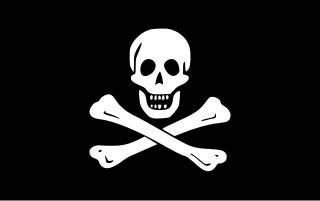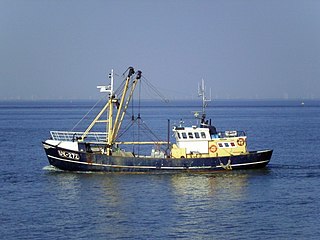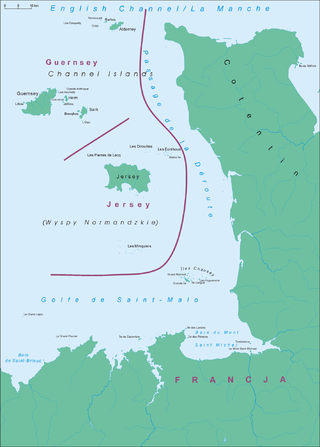
Piracy is an act of robbery or criminal violence by ship or boat-borne attackers upon another ship or a coastal area, typically with the goal of stealing cargo and other valuable goods. Those who conduct acts of piracy are called pirates, and vessels used for piracy are called pirate ships. The earliest documented instances of piracy were in the 14th century BC, when the Sea Peoples, a group of ocean raiders, attacked the ships of the Aegean and Mediterranean civilisations. Narrow channels which funnel shipping into predictable routes have long created opportunities for piracy, as well as for privateering and commerce raiding.

The Embargo Act of 1807 was a general trade embargo on all foreign nations that was enacted by the United States Congress. As a successor or replacement law for the 1806 Non-importation Act and passed as the Napoleonic Wars continued, it represented an escalation of attempts to persuade Britain to stop any impressment of American sailors and to respect American sovereignty and neutrality but also attempted to pressure France and other nations in the pursuit of general diplomatic and economic leverage.
Admiralty law or maritime law is a body of law that governs nautical issues and private maritime disputes. Admiralty law consists of both domestic law on maritime activities, and private international law governing the relationships between private parties operating or using ocean-going ships. While each legal jurisdiction usually has its own legislation governing maritime matters, the international nature of the topic and the need for uniformity has, since 1900, led to considerable international maritime law developments, including numerous multilateral treaties.

English law is the common law legal system of England and Wales, comprising mainly criminal law and civil law, each branch having its own courts and procedures.
The Navigation Acts, or more broadly the Acts of Trade and Navigation, were a long series of English laws that developed, promoted, and regulated English ships, shipping, trade, and commerce with other countries and with its own colonies. The laws also regulated England's fisheries and restricted foreign—including Scottish and Irish—participation in its colonial trade. While based on earlier precedents, they were first enacted in 1651 under the Commonwealth.

A shipwreck is the wreckage of a ship that is located either beached on land or sunken to the bottom of a body of water. Shipwrecking may be intentional or unintentional. There were approximately three million shipwrecks worldwide as of January 1999, according to Angela Croome, a science writer and author who specialized in the history of underwater archaeology.

Impressment, colloquially "the press" or the "press gang", is a type of conscription of men into a military force, especially a naval force, via intimidation and physical coercion, conducted by an organized group. European navies of several nations used impressment by various means. The large size of the British Royal Navy in the Age of Sail meant impressment was most commonly associated with Great Britain and Ireland. It was used by the Royal Navy in wartime, beginning in 1664 and during the 18th and early 19th centuries as a means of crewing warships, although legal sanction for the practice can be traced back to the time of Edward I of England. The Royal Navy impressed many merchant sailors, as well as some sailors from other, mostly European, nations. People liable to impressment were "eligible men of seafaring habits between the ages of 18 and 55 years". Non-seamen were sometimes impressed as well, though rarely. In addition to the Royal Navy's use of impressment, the British Army also experimented with impressment from 1778 to 1780.
The International Regulations for Preventing Collisions at Sea 1972, also known as Collision Regulations (COLREGs), are published by the International Maritime Organization (IMO) and set out, among other things, the "rules of the road" or navigation rules to be followed by ships and other vessels at sea to prevent collisions between two or more vessels. COLREGs can also refer to the specific political line that divides inland waterways, which are subject to their own navigation rules, and coastal waterways which are subject to international navigation rules. They are derived from a multilateral treaty called the Convention on the International Regulations for Preventing Collisions at Sea, also known as Collision Regulations of 1960.

R v Secretary of State for Transport was a judicial review case taken against the United Kingdom government by a company of Spanish fishermen who claimed that the United Kingdom had breached European Union law by requiring ships to have a majority of British owners if they were to be registered in the UK. The case produced a number of significant judgements on British constitutional law, and was the first time that courts held that they had power to restrain the application of an Act of Parliament pending trial and ultimately to disapply that Act when it was found to be contrary to EU law.
Prize money refers in particular to naval prize money, usually arising in naval warfare, but also in other circumstances. It was a monetary reward paid in accordance with the prize law of a belligerent state to the crew of a ship belonging to the state, either a warship of its navy or a privateer vessel commissioned by the state. Prize money was most frequently awarded for the capture of enemy ships or of cargoes belonging to an enemy in time of war, either arrested in port at the outbreak of war or captured during the war in international waters or other waters not the territorial waters of a neutral state. Goods carried in neutral ships that are classed as contraband, being shipped to enemy-controlled territory and liable to be useful to it for making war, were also liable to be taken as prizes, but non-contraband goods belonging to neutrals were not. Claims for the award of prize money were usually heard in a prize court, which had to adjudicate the claim and condemn the prize before any distribution of cash or goods could be made to the captors.
The Receiver of Wreck is an official who administers law dealing with maritime wrecks and salvage in some countries having a British administrative heritage. In the United Kingdom, the Receiver of Wreck is also appointed to retain the possession of royal fish on behalf of the British crown.

The Merchant Marine Act of 1920 is a United States federal statute that provides for the promotion and maintenance of the American merchant marine. Among other purposes, the law regulates maritime commerce in U.S. waters and between U.S. ports. Section 27 of the Merchant Marine Act is known as the Jones Act and deals with cabotage. It requires that all goods transported by water between U.S. ports be carried on ships that have been constructed in the United States and that fly the U.S. flag, are owned by U.S. citizens, and are crewed by U.S. citizens and U.S. permanent residents. The act was introduced by Senator Wesley Jones. The law also defines certain seaman's rights.

The Statute of Westminster Adoption Act 1942 is an act of the Australian Parliament that formally adopted sections 2–6 of the Statute of Westminster 1931, an Act of the Parliament of the United Kingdom enabling the total legislative independence of the various self-governing Dominions of the British Empire. With its enactment, Westminster relinquished nearly all of its authority to legislate for the Dominions, effectively making them de jure sovereign nations.

The Piracy Act 1837 is an Act of the Parliament of the United Kingdom. It abolished the death penalty for most offences of piracy, but created a new offence often known as piracy with violence, which was punishable with death. This offence still exists in the United Kingdom and in Ireland, but is no longer punishable by death in either country.

The Prince Edward Islands Act, 1948 is an act of the Parliament of South Africa that annexed the Prince Edward Islands to the Union of South Africa. The South African flag was hoisted on Marion Island and Prince Edward Island on 29 December 1947 and 4 January 1948 respectively, and a proclamation of annexation was promulgated on 24 January 1948. The annexation was confirmed by Parliament by the Prince Edward Islands Act, which was signed by the Governor-General on 1 October 1948 and came into force upon publication on 7 October.

United States v. Approximately 64,695 Pounds of Shark Fins is a 2008 decision of the United States Court of Appeals for the Ninth Circuit concerning civil forfeiture in admiralty law. Judge Stephen Reinhardt wrote for a three-judge panel that ordered that the shark fins be returned to their owners, reversing a decision by the Southern District of California. The government did not appeal the case further.

The Channel Islands are a group of islands off the coast of France. The largest island is Jersey, followed by Guernsey, Alderney, Sark, and a number of smaller islands, islets and rocky outcrops. The islands were separated from mainland Europe with rising sea levels in the Neolithic period; thereafter maritime activity commenced.

The Admiralty Court Act 1861 is an act of the Parliament of the United Kingdom. The act addresses the jurisdiction and practices of the High Court of Admiralty. The act received royal assent on 17 May 1861 and came into force on 1 June 1861.

The Canada Shipping Act is legislation enacted by the Parliament of Canada, governing the powers of government to regulate the registration and operation of ships and pleasure craft, including personnel and navigation. The Act also establishes the legal regime that governs naval accidents in Canada's waters, as well as marine pollution of any seafaring vessels. The Act was amended in 2019, and sees regular amendment.













